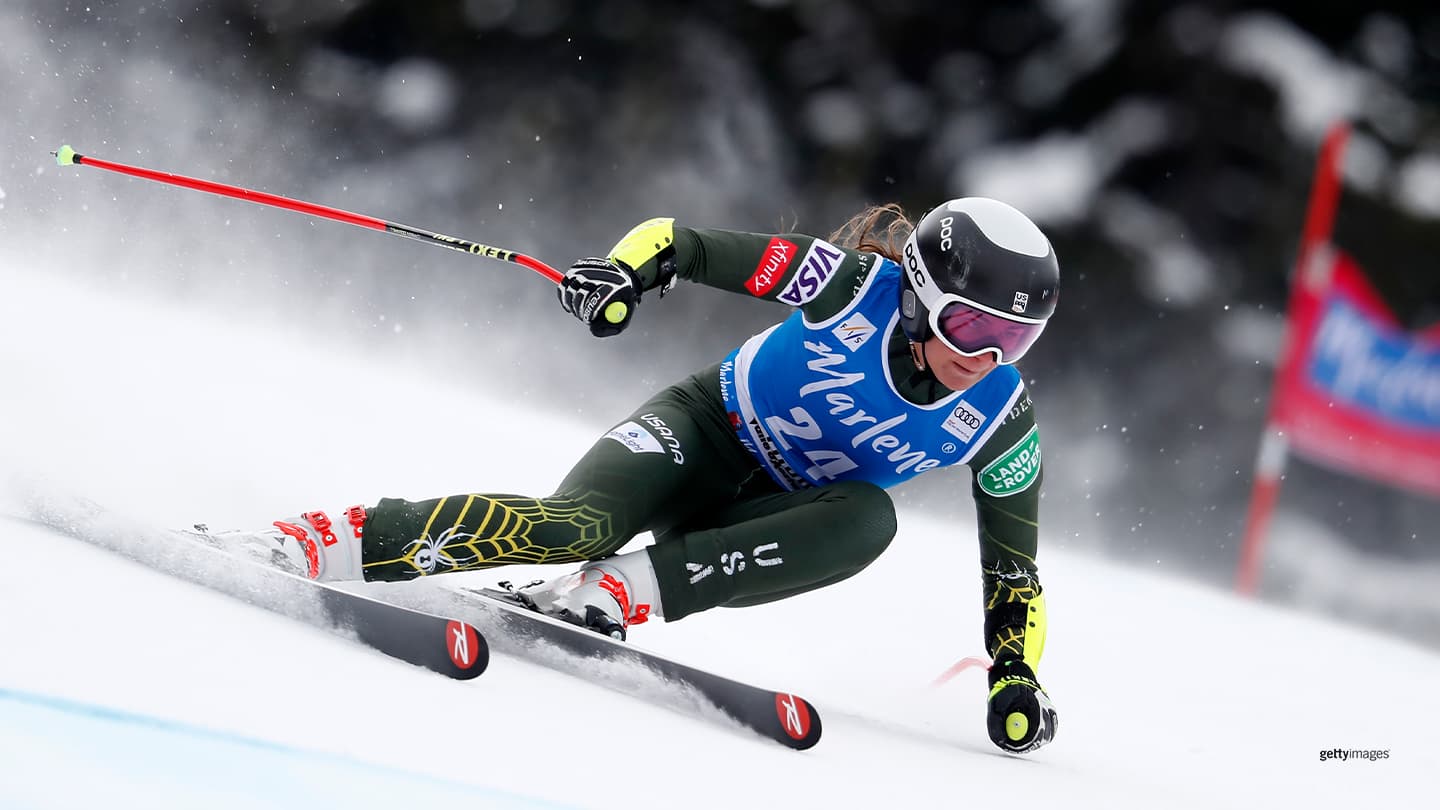
Alpine Skier Alice Merryweather Talks About Her Battle With Anorexia Nervosa
by Alice Merryweather

Alice Merryweather in action during the Audi FIS Alpine Ski World Cup Women's Super G on Feb. 29, 2020 in La Thuile, Italy.
COVID-19 has affected sports in many ways throughout the past year. Not only has COVID threatened our physical wellbeing, but it has also placed more strain on everyone’s mental health.
I’m no stranger to this myself; in the spring of 2020, early into the pandemic lockdown, my mental health took a deep dive. I was struggling to find housing for the summer, taking a hefty course load remotely through Dartmouth College, and battling a severe fear of complacency as spring training ramped up. This perfect stress-storm, abetted by the uncertainty of lockdown and the new virus, was the final blow that sent me deep into my own mental health crisis: a battle with anorexia nervosa.
Though I wasn’t formally diagnosed until October 2020, I began significantly restricting my intake sometime in March. In each of the three or four years prior, I would end my race season thinking some version of this to myself: “you should really go on a diet. All that European hotel food has been making you fat, and you don’t even look like an athlete anymore.”
Last spring, I hit a new low. I resented myself from a performance standpoint for not meeting my goals. Physically, I believed I had overeaten every day and couldn’t even bring myself to look in a mirror. Mentally, I felt disappointed, upset, and like I no longer controlled my own destiny. Unintentionally, my eating disorder became my way back to some semblance of control (or so I thought).
My brain felt like a tornado most days back then. The only way I could get it to slow down, to not abuse me for doing something wrong or for not doing enough academically or athletically, was to stop eating. Fasting periods gave me that mental reprieve. I believed that I was strong for not letting myself eat when I desperately craved food, and I conditioned myself that way over and over again throughout the spring. In just a few short months, the disorder changed the way I thought about food. I told myself and others that I didn’t want it, that I wasn’t hungry, or that I hadn’t done enough to “deserve” it (this saying is now one of my biggest pet peeves—everyone deserves to eat!!). Food went from being something necessary that I could enjoy, to something gluttonous, evil and tempting. I felt upset every time I ate even a morsel because it went against my conditioned fear response. Plus, the harder I tried not to think about food, the more I craved it. The disorder seemed to constantly build on itself, and with each day it got stronger, I got weaker.
I remember feeling proud when our June body composition tests showed that I had lost a substantial amount of weight and my body fat proportion was down. At that point, I decided I wouldn’t actively try to lose more weight, I would just try to maintain my size while I trained in the gym all summer. Of course, the eating disorder had other ideas. My thoughts about food were already so warped that I couldn’t break the disordered eating cycle. Even throughout our peak training months of June, July, and August, I completed double session training days and Dartmouth summer-term classes on a very limited diet. Unsurprisingly, I experienced mental breakdowns more and more frequently, and I slowly lost the ability and energy to feel genuine joy (among other emotions). Still, the eating disorder was convincing, and I truly believed I was getting stronger.
That lie came crashing down in September when I went over to Europe for an on-snow camp. I didn’t have the energy I needed to sustain the training load, my thoughts about food consumed immense brainpower both on and off the hill, and I no longer felt passionate about skiing. I thought I was depressed, and I considered quitting. During that camp, my coaches and team medical staff realized something was truly wrong, and not even a week after returning home in October, they sent me to specialists who formally diagnosed me with anorexia nervosa. In November, after failing to make any significant progress in a makeshift outpatient program, I opted to forego the world cup and world championship season to instead enter treatment at a formal partial-hospitalization program.
This past year still feels a bit surreal as I look back on my recent mental health journey. I have been out of treatment for four and a half months, and the distance I’ve gained from my eating disorder has given me a new outlook on life. I now understand how to listen to myself—not my eating disorder, but my authentic self’s needs and desires. I have learned to respect my mind and body for what they can do, rather than berate them for what they cannot. I have learned that it’s okay, and even empowering at times, to seek out help. Asking for help doesn’t make someone weak, but rather it makes them courageous enough to admit their vulnerabilities and try to improve. And this is not something we can do alone; I would not be where I am today in my recovery without relying on my support system.
I encourage anyone who is struggling to talk to someone, whether they’re a friend or family member or a professional. It might be the scariest thing you do, but it also might end up being the best.